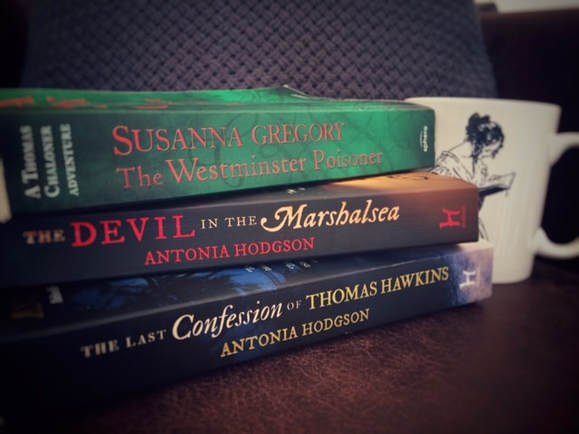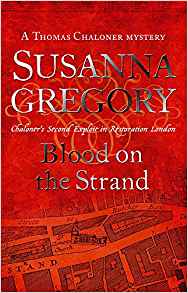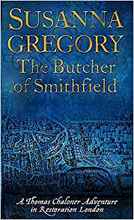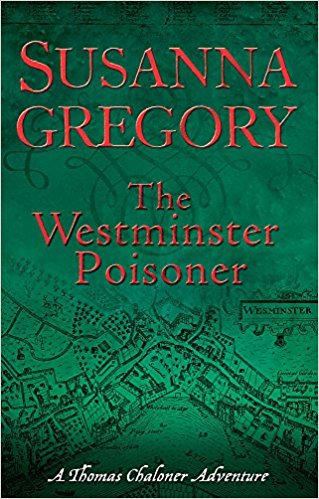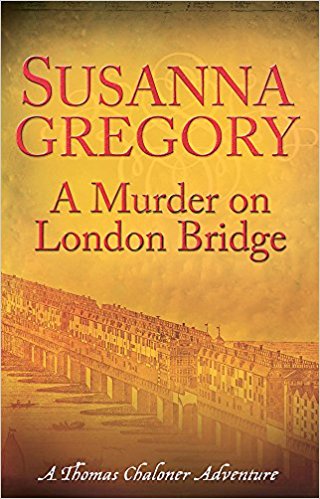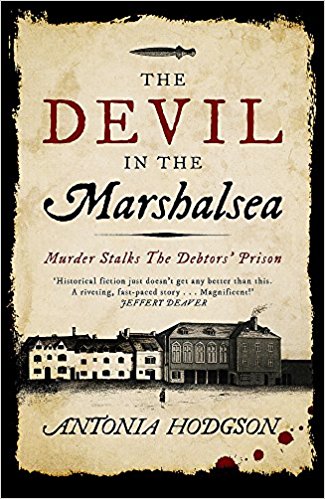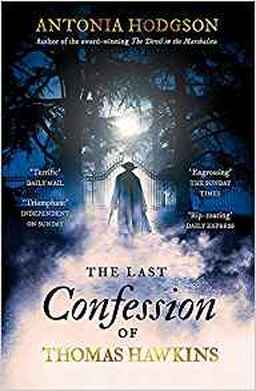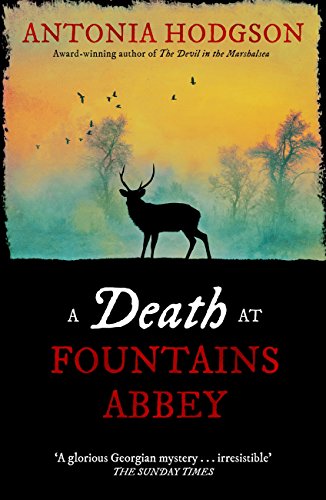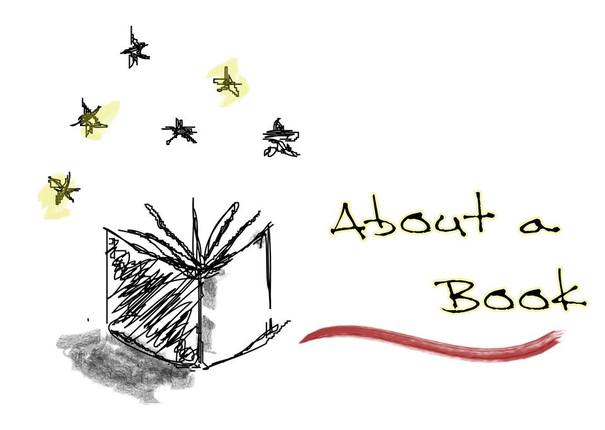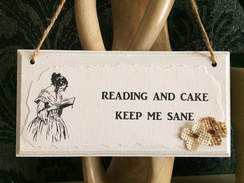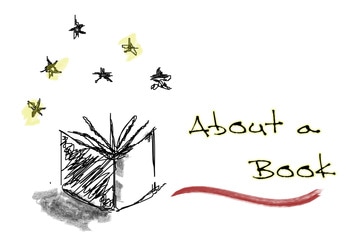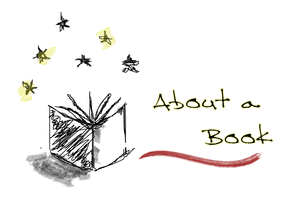|
So this little blog has been abandoned lately. I've had good reason but I'm back now and want to breathe new life into it. Give it a Spring clean. Get going again. And I'm going to start off with a look at what I've been reading since my last post. For a while I was reading books, novels mostly, which I just didn't like very much. I began to think I'd lost my love of reading. I was wondering whether my efforts in learning how to construct a story had resulted in me subconsciously deconstructing and evaluating everything I was reading. It was annoying and upsetting as reading has always been a safe haven for me. Something I could always rely on to distract and absorb me for a while. And if I ate a box of chocolates at the same time, what of it? I gave it some thought and carefully put together a Christmas wish list of books I had wanted to read for a while but hadn't got around to. I also bought myself three novels and, by January, I had a new pile of books to read. Fortunately, they got me going again. My interests and genres are varied but I decided to largely go with historical mysteries. I missed that feeling of devouring a series by the same author, the excitement of reading a book where I was already attached to the characters or the period and so didn't need to put in as much effort upfront. And it worked. I've read more than I had in the months before and, most importantly, I'm enjoying it again. So here are the books that got my reading mojo back for me: 1. The Thomas Chaloner series set in Restoration London (circa 1660's) by Susannah Gregory I LOVE this series. The books featured above are numbers 2-5. I read the first one, 'A Conspiracy of Violence' at the end of 2015 and my review can be found here: http://bit.ly/2Hvd4I6. Each book has a complex mystery, or series of mysteries which generally come together, at its heart. The regular characters are all there and are developed a little as each book goes by. My favourite relationship is between the main character, Thomas Chaloner, and his ex-boss, Thurloe, who used to be spymaster for the previous regime of Oliver Cromwell. They try to remain friends even when their interests are not aligned. Each time I pick up one of these books I know I am in capable hands. The writing style is accomplished yet accessible and I am quickly drawn in to the period in which the stories are set. I find them absorbing and satisfying, The books do have a large cast of characters and it can sometimes be difficult to keep track of everyone, particularly if there is a gap when you put the book down and don't return to it for a while. Also the pace does not race along, but neither does it drag and I see this as a major advantage of the series. The pace allows the reader to dally just long enough in the details of everyday life of the period, (wonderfully brought to life by the writer) without hampering the plot. It's a fine balance - drag and you lose the reader, dash along and you lose the atmosphere. For me, it is handled beautifully. There are 12 books in this series and I can't wait to read them all. Oh - and they have maps! For more of a flavour, head over to the author's website where she sets out each title in order and gives plot teasers: https://www.susannagregory.com/thomas-chaloner/ 2 Thomas Hawkins series by Antonia Hodgson I read these books in the wrong order. I began with 'A Death at Fountains Abbey' then went back to the beginning. My review of the third in the series can be found here: http://bit.ly/2zdwgHn. I have found the other two books to be consistently good. Excellent, to be honest. Here is another talented writer who can weave together wonderful mysteries, great characters and a fabulous period setting. The books are shorter than the Thomas Chaloner series, reviewed above, and the pace is certainly brisker but I find that they actually compliment each other well and I have been happily switching between the two series. The stories take place around 60 or 70 years later than the Chaloner books. The first is primarily set in the Marshalsea - a debtors' prison with two sides - one for gentlemen and one for, well, everyone else. The story takes you to both parts and, be warned, does not spare the reader any of the horrific details. I loved it, though. The characters and the plot develop quickly and the setting is meticulously researched and cleverly brought to life. The writing-style is so good it is hard to believe it is a first novel and certainly sets the bar very high for the rest of us. I'm currently only half-way through the second but enjoying it immensely and could happily finish it in one sitting, if I ever had the time. This is one of those rare series where I will be waiting for the next one to come out and will buy it immediately. 3 The Ashes of London by Andrew Taylor 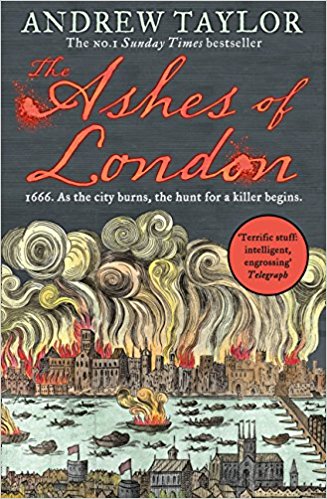 This has been on my list for ages. I'd seen so many recommendations that I had to give it a go. I've never read anything else by this author and this book is not part of a series. I'm really glad I read it. I thought I was going to struggle at first as it is set at the same time as the Susannah Gregory book I had just finished reading and it was disconcerting at first. Of course this is entirely down to me and nothing to do with the book or the writer. It was an easy book to read. Well written and really interesting, The details of the fire of London are fascinating and I felt as though I was being taken as close as is possible without a time machine, to the obliteration of London at that time. For this reason it is a book I will always remember reading. I think I would have enjoyed it more if I hadn't been expecting something different. The strap line on the cover: 'As the city burns, the hunt for a killer begins' made me think I was going to read a thriller-type novel but it was much slower than that. I would go as far as to say it was more of a character piece than a mystery. I was a little surprised to find out that the author is an experienced crime writer as it just wasn't the main focus of this book. Having said that, it had many excellent points and is a good, expertly-written piece of historical fiction. Writing this makes me wonder if I've had historical fiction overload! I'm used to hopping around more, from fantasy and sci-fi to crime etc but the lesson I am going to take away is this - read what makes you happy. It is not meant to be a chore. If you lose your mojo have a look around for a story which will bring it back because it's out there - that story and your reading mojo! I'm just glad that I have found mine.
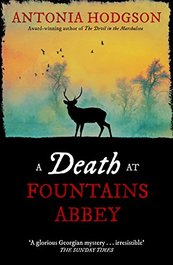 I love this book. I love the cover, the title, the period it is set in and I love the easy yet accomplished way in which the author tells a well-paced mystery. I should point out that this is the third in a series and that I read it without having read the first two. Fountains Abbey isn't too far from where I live, just north of Leeds in Ripon, and I've been there. It is wonderfully atmospheric and when I saw a book naming it in the title I just picked it up and bought it without knowing very much. I was in a hurry and, once I had established that it was a historical murder mystery, I was happy to give it a go. Thomas Hawkins is the man to whom it falls to investigate threats which have been made against a disgraced politician who has been forced to abandon public life following the South Sea fiasco which left hundreds ruined. He has an ulterior motive but I'll leave it to you to discover what that is. He is ably assisted by the feisty Kitty and a young boy. It is set at Studley Hall and Fountains Abbey in 1728, when the water gardens at the Abbey were being created by the family at the heart of the plot. (These gardens are now a World Heritage site administered by the National Trust.) The plot moves on at a good pace and drew me in from the start. In my opinion the book also benefits from not being too long. I've read a few books lately which run ON such that the pace suffers and my attention falters. However, at a tidy 344 pages, it is just about right. There is plenty of action, good characterisation, an interesting mystery and plenty of luscious period details. And it is all written in elegant prose which doesn't distract from the story. What more can you ask for? I will definitely be reading the preceding books. Now, where's that Christmas list gone? Some pieces from my Etsy store:
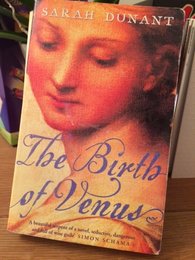 Today I am reviewing a book my mum passed to me about a year ago. I knew nothing about it at the time and so 'The Birth of Venus' sat on the shelf for a few months in the queue. Then I began to notice people on Twitter and so forth saying how good it was (even though it was published in 2003). Plus my mother has pretty good taste, so in November last year I decided to give it a go. I read the jacket and the testimonials and felt a quiver of excitement. I could see why Mum had been drawn to it and why she thought I might like it - it is set in Medici Florence and is steeped in beautiful art. Definitely my sort of read. Also, all the notable newspapers heap praise upon it, all the way down the back cover: a 'moving, gripping and impressive work' - Sunday Times, 'magnificent' - Daily Telegraph, 'Erotic and gripping' - Independent on Sunday and, in my opinion the worthiest of all praise from the Observer: 'As soon as I finished this book I wanted to go straight back and read it all over again.' I don't know if it was all the hype or the fact that the baby wasn't (still isn't) sleeping so my concentration was lacking but I had a couple of false starts where I struggled to get past the first two chapters. But all those recommendations nagged at me and so I persevered. In the end I got into it and finished about a month ago. I then postponed writing this review while I pondered. In the end I decided that the simplest thing is to be honest and say that I have mixed feelings about this book. It is supremely written. And I mean absolutely gorgeously written. Every sentence flows and weaves expertly, bringing Medici Florence to life in an incredibly accomplished and evocative manner. I could never hope to write something so beautifully. In this sense I totally agree with all the praise. Where I did struggle a little, however, was with the plot.
The heroine of the piece is a young Florentine girl, Alessandra Cecchi. She has a place in her family and within the structure of society but she is not fulfilled by it. She is intellectually hungry yet is constantly required to control her desire for knowledge, exploration, life and art. She is herself a talented raw artist with a level of ability which would have blossomed had she been given the encouragement and tuition of her male counterparts. This is her struggle. As the Medicis fall and Florence is plunged into dangerous chaos she must make difficult decisions and painful sacrifices yet she is young and naïve and these decisions have consequences that she does not foresee. These are intense and important themes and drew me in but I did find the pace slow at times. There isn't an obvious plot to pull the reader along, although the prologue does raise significant questions which helped to keep me reading. When I had finished the book I was glad that I had read it and it will stay with me for a while. If you like historical settings and are not looking for a page-turner of a plot, this is an exquisitely written intelligent work which should please. 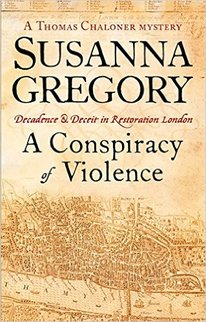 2006/2007 (paperback) by Time Warner Books/Sphere 2006/2007 (paperback) by Time Warner Books/Sphere I came upon this author only a few weeks ago whilst killing ten minutes browsing in WH Smiths. I don't mean that she was actually lurking in the store but rather that my eyes were drawn to a book called 'The Cheapside Corpse' which had an interesting cover and, upon closer inspection, promised to be a historical mystery. When I realised that it was the latest in a series I decided to acquire the first one and start from the beginning (for once). If you have been reading my reviews on a regular basis you'll know that I struggled with my last read and, if I am being honest, with a few books which I have not reviewed on here. I therefore needed something to restore my enthusiasm; something which was both well written and absorbing. I'm so pleased to say that this book was definitely that something. It was first published in the UK in 2006 and begins a series following the adventures of Thomas Chaloner, an English spy recently returned to Restoration London from Holland. He finds himself penniless and in need of work. He turns to his previous employer and is soon treading a very fine and consistently dangerous line between a number of interlinked investigations and intertwined relationships. There is plenty of murder and intrigue to satisfy lovers of crime novels and the setting is so vivid that it drew me in at once and will doubtless appeal to fans of historical fiction. London in 1662 is brought to life superbly and in a subtle way which does not involve reams of description but rather provides an immersive backdrop to what turns out to be a complex story. It is extremely accomplished and I was not at all surprised to find that this author has an extensive back catalogue featuring another series character, Matthew Bartholomew, (set in the fourteenth century) and that there are many Thomas Chaloner novels for me to devour. It was a total pleasure, feeling like I was in the hands of an experienced and talented writer who would not let me down. Having said all of that, I can see how some readers might find the sheer numbers of characters in this book overwhelming. Indeed, I found it hard to keep up at times, especially since many of them were referred to sometimes by first names, by second names and also by their titles (eg the Earl). At times I was lost but I went along with it and I kept up most of the time. A strong lead character with a few key people around him helped. but make no mistake, there is a lot going on in this book. The writing is so smooth that it is not difficult to read in that sense but the layers of complexity do necessitate a fair amount of recapping - done largely through the thoughts of Thomas Chaloner. So if you are looking for something simple, perhaps this isn't for you but I personally adored the fact that there was so much going on, lots of twists and red herrings and colourful characters. For the first time in a while I reached the end of a novel wishing I had the sequel already on my bookshelf. A hearty thumbs up and five stars from me. In the new year I will doubtless be reviewing some of my Christmas reads, but I also hope to post a few writing-related articles. I am thinking: an update/reflection on how the experience of self-publishing 'Into Dust' has gone and also a piece on how I began writing, the path I have taken so far and some of the key decisions I have made along the way. In the meantime, thanks for reading and have a wonderful Christmas holiday x 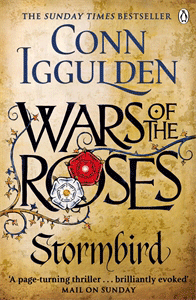 Published by Michael Joseph 1st edition (10 Oct. 2013) Published by Michael Joseph 1st edition (10 Oct. 2013)
This is the first of a trilogy relating to the Wars of the Roses. Book 2 (Trinity) was published September 2014 and the final instalment (Bloodline) is scheduled for release in September this year. My version is a beautiful, sturdy hardback. The cover gleams gold and there is a coloured map at the front and a lovely illustrated royal family tree at the back. I acquired it shortly after its release when I attended a talk by the author at Sheffield central library. If you ever get the chance to attend one of Conn Iggulden's talks I would urge you to go. An ex-teacher, he is used to holding the attention of an audience and is funny, engaging and endlessly charming.
I'm not sure why it took me so long to get around to reading it. Whilst it is a lovely book it is rather heavy and, as it is signed, I was probably a little nervous about messing it up by slinging it about in my bag. It is no reflection, though, on how I felt about it and I was excited to finally begin reading. 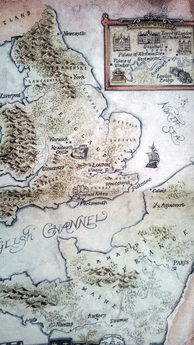
Most people are familiar with the exploits of Henry V; the great warrior King who conquered much of France. Also many are aware of the bloody English civil war which ripped the country apart as the red rose of Lancaster battled the white rose of York. This book, however, bridges the gap between the two. Henry VI is a frail and weak king and France is growing bold. The inside flap of the jacket reads:
''King Henry V - the great Lion of England - is long dead. In 1437, after years of regency, the pious and gentle Henry VI, the Lamb, comes of age and accedes to the English throne. His poor health and frailty of mind render him a weakling king - Henry depends on his closest men, Spymaster Derry Brewer and William de la Pole, Duke of Suffolk, to run his kingdom. Yet there are those, such as the Plantagenet Richard, Duke of York, who believe England must be led by a strong king if she is to survive. With England's territories in France under threat, and rumours of revolt at home, fears grow that Henry and his advisers will see the country slide into ruin. With a secret deal struck for Henry to marry a young French noblewoman, Margaret of Anjou, those fears become all too real. As storm clouds gather over England, King Henry and his supporters find themselves besieged abroad and at home. Who, or what can save the kingdom before it is too late?'' My view: Conn Iggulden is an expert in writing historical fiction. His writing style is accomplished yet accessible and he manages to bring the past tantalisingly to life. The book balances political intrigue with battlefield action and the pace is good. This is around the sixth book I have read by this author and it seems to me as if he is becoming even more readable. I particularly enjoyed the portrayal of Henry VI's young bride, Margaret of Anjou, as in the other books I have read set in this period she is an older and battle-hardened woman. It was interesting to consider her early vulnerability and dedication to her cause and her king. I did stutter a little when the story lingered on the skirmishes in France. They went on a little too long for my taste as, personally, I prefer the political machinations and I probably would have enjoyed it more had it been 50 pages or so shorter. But I know that these books appeal to a range of people who have different preferences when it comes to reading historical fiction and I think that Conn Iggulden does an excellent job in catering for most tastes. His ratings on Amazon are consistently high and I am looking forward to reading the rest of the series.
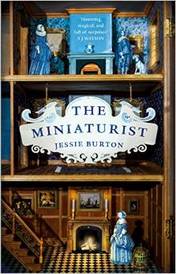 Published by Picador July 2014 Published by Picador July 2014 The Miniaturist is a wildly successful novel, winning multiple awards and topping bestseller charts for weeks. An auspicious start for a debut author and I couldn't wait to get my hands on a copy. The version I read comprised a beautiful hardback edition (pictured below). Set in Seventeenth-Century Amsterdam, the plot centres around eighteen-year-old Nella who has been plucked from a rural village to be the wife of a wealthy trader whom she barely knows. Naive and innocent, Nella is plunged into a family drama for which she is ill prepared. As events unfold, Nella takes strange comfort from tiny gifts which arrive from a mysterious woman who displays an unnerving talent for foresight. I found The Miniaturist to be an exquisitely written tale. The fluidity of the prose is as breathtaking as it is accessible. This is literature of the highest quality. The language dances across the page, gently unfolding a story which is a joy to read. Jessie Burton brings Amsterdam in 1686 vividly to life, with characters so real you feel you know them. The political situation and religious influences are woven together cleverly into a tale of love and loss which is gripping throughout. The book also contains a Seventeenth-Century Dutch Glossary which explains the local and time-specific references used. 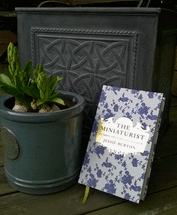 By the end, I did have a couple of issues with the plot but these did not seriously detract from my enjoyment or appreciation of the book. Nevertheless, I would have liked more closure and I think my reading of it suffered a little from a misconception I had when I began reading. For some reason (presumably reviews I had read and also the book blurb) I had thought that I was reading a mystery - one with a puzzle, clues and resolution. This isn't really the case. For me, The Miniaturist really shines through as a wonderful, evocative exploration of family, of love (and hate), of politics and religion at a time and in a place about which I knew almost nothing. It is heartening that such quality has translated into sales and I look forward to the next offering by this talented author. |
Bernadette KeelingI love most types of fiction - crime, mystery, fantasy. Oh, and historical fiction of course and middle-grade books and, well, you get the picture. Subscribe for Blog updates via email:Categories
All
Archives
April 2019
Unique, handcrafted items for readers and writers:
|
B.M. Keeling
